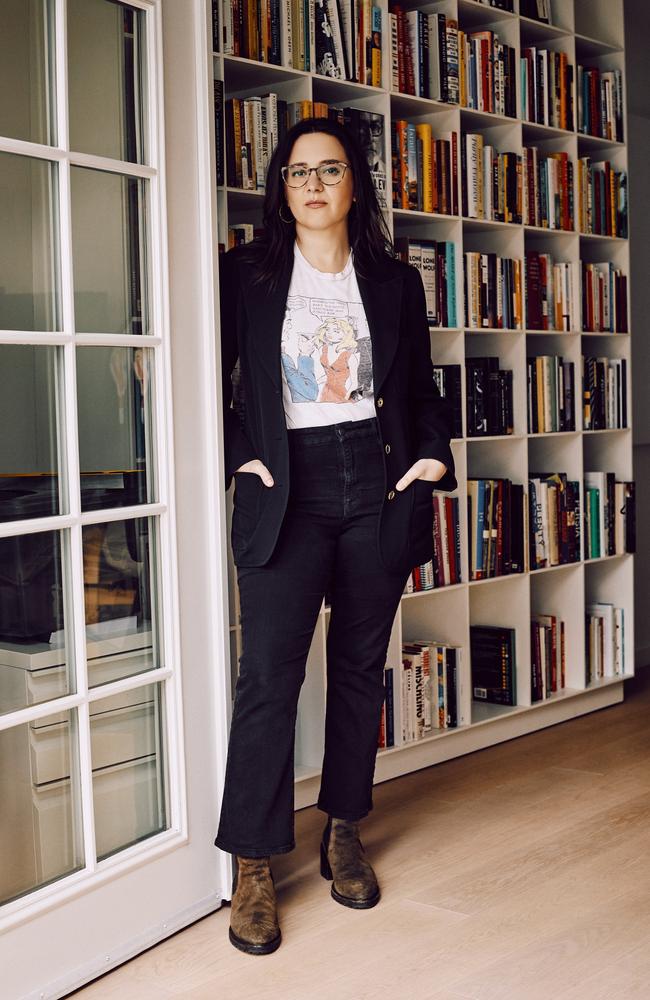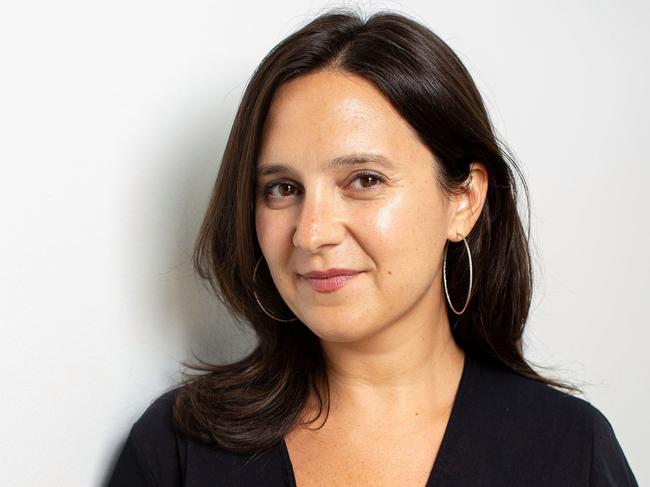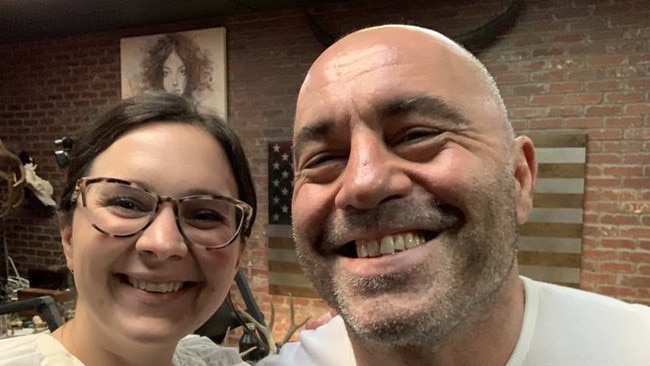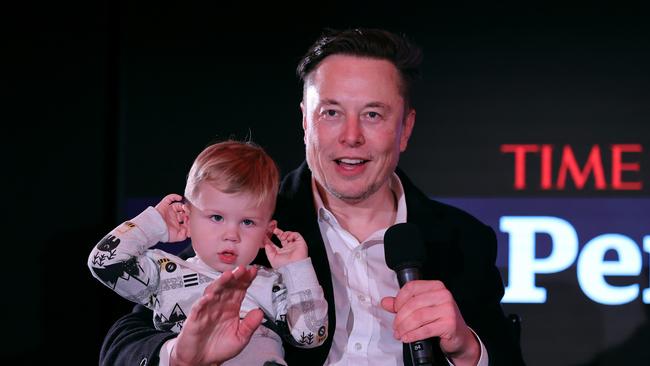How Bari Weiss fought for her own free press
The former New York Times opinion columnist, whose epic resignation letter went viral, has spent her eventful career in the war zones of public discourse. Now, she’s moving into a new phase.

The journalist Bari Weiss has spent her short and vertiginously eventful career in the war zones of public discourse. She first tasted battle in a campus controversy over anti-Semitism as a student at Columbia University, New York. For a few years in her early 30s she was America’s most controversial newspaper columnist, hammering away at the progressive left from the unlikely vantage point of The New York Times’ op-ed page. Eventually, she hammered with such vigour that she caused an internal culture war at the newspaper. Younger staff became outraged and Weiss duly expelled herself, writing an epically viral resignation letter that accused the paper of being cowed by censorious forces on social media – “Twitter is not on the masthead of The New York Times. But Twitter has become its ultimate editor,” to quote its most ringingly memorable line.

Now 38, her media career is moving into a new phase as the founder of her own news organisation, the Free Press, which has 325,000 subscribers (to sign up costs $8 a month). Success has brought further notoriety as well as revenue – in December she received a text from Twitter’s new proprietor, Elon Musk, summoning her to the company’s HQ to seek out evidence of progressive bias under the previous management. Weiss’s “The Twitter Files” launched her back into a series of fresh controversies over free speech. The Free Press is producing The Witch Trials of J.K. Rowling, a highly publicised podcast hosted by Megan Phelps-Roper about the Harry Potter author’s involvement in the transgender debate.
For progressives, Weiss’s ubiquity is a source of howling, derisive rage – she is a “Nazi”, “incendiary”, a distributor of “far right” materials and “absolutely, categorically stupid”. To mention her name on many left-wing podcasts is to invite whole minutes of contemptuous, exhausted sighing. But to old-school liberals and those on the moderate right, her presence is reassuring. For them, it is a relief to see an educated young bisexual woman in fashionable glasses defending free speech rather than, say, a wailing mystagogue such as the philosopher Jordan Peterson, or an eccentric like the podcaster Joe Rogan, whose rambling condemnations of progressive intolerance are unhelpfully interspersed with esoteric speculation about whether, say, it might be possible to use psychedelic drugs to communicate with aliens.
This, however, is a dangerous way to live. The accelerator pedal of the public outrage machine is jammed to the floor. The intense energies generated by modern intellectual warfare have melted fuses and burnt out the wiring in many of the best minds of a generation – half of Peterson’s public appearances now seem to involve tear-streaked nervous breakdowns; formerly mainstream journalists like Glenn Greenwald have drifted towards conspiracy and paranoia.
Perhaps this is why I am half-expecting someone insane. But Weiss, who speaks to me from her home in Los Angeles, is disarmingly normal – vivacious, if somewhat tired. Tiredness, presumably, is the natural condition of a new mother (her wife, Nellie Bowles, gave birth late last year) running one of the English world’s best-known media start-ups out of her kitchen. She is lavishly and perhaps calculatedly charming. “It’s so funny, I’m so familiar with your face,” she coos, referring to my byline picture. She is aware, of course, that there are few comments more gratifying to a columnist’s ego – it says a) I know your work, and b) you don’t look much fatter or more haggard than the flattering, out-of-date photograph that accompanies it. A friend of Weiss’s assures me the charm is real, not just for journalists. Previous interviewers have given the impression of coming away suspiciously flushed and discomposed by the Weiss megawatts. In the face of her charisma, I feel a certain stolid English reluctance.

Let us say, then, that I have the impression of someone confident in the effect she’s making. The same assurance characterises her writing. Some columnists write like furious drunks falling backwards into a pub brawl, their fists wheeling at all comers. But in the New York Times columns that made her name, Weiss has the air of a professional dynamiter who has calibrated her tonnage of explosives precisely. She criticised students who “believe that free speech is acceptable only when it doesn’t offend them. Which is to say, they don’t believe in it at all.” She had even less time for overzealous #MeToo social media activists whose “insidious” attempt to “criminalise awkward, gross and entitled sex takes women back to the days of smelling salts and fainting couches”.
Weiss was picked up by The New York Times as an “intellectual diversity hire”, having started her career on the right-leaning Wall StreetJournal. Her new employers may not have counted on quite so much intellectual diversity. Each column blew open huge holes in the public discourse. As Weiss had surely anticipated, the ensuing controversy was excellent for her career. Few journalists ever become stars, but the talk-show host Bill Maher only had to read one Weiss column (a defence of the comedian Aziz Ansari against allegations of sexual assault headlined, “Aziz Ansari is guilty. Of not being a mind reader”) to decide he was “going to make her famous”. She owed much of her early popularity to Maher’s show, Real Time.
Weiss is not a deep thinker (emphatically not, for instance, the sort of person to see the culturewar as a civilisational battle for the soul of the West). And she is not, with her jabbing declarative sentences and leaden sarcasms, an unusually beautiful writer. Her skill resides in two qualities: “bravery” and what she modestly describes as “timing”. She turned up to all the best fights. And she turned up early. Weiss has an enviable knack of seeing which currently controversial positions will once again become common sense and throwing herself behind them.
To understand the drama of Weiss’s first forays into public debate, it helps to recall that the culture wars have become attritional. The present mood of stasis can obscure the way that only a few years ago, all the solid moral ground seemed to be falling away beneath our feet. As the earth shook, Hollywood idols clattered to the ground and institutions lurched and tottered, frantically expelling any staff who seemed marked by the curse of moral transgression.

The New York Times pressured its opinion editor into resigning for publishing an editorial by the Republican senator Tom Cotton arguing the military should be brought in to contain the Black Lives Matter protests. The same treatment was applied to another of the newspaper’s journalists for using the n-word in front of students as part of a conversation about racist language. Amid all this controversy and uncertainty, Weiss seemed to write from a foundation of solid rock, to possess a weird and unselfconscious confidence in her access to some eternal repository of common sense. Her positions have the eccentricity that is the guarantee of authenticity if not always rigour. She is pro-free speech, pro-immigrant, pro-feminist, anti-#MeToo overreach. She is also a Zionist of deep and polarising conviction – a subject tackled in her hastily written polemic, How to Fight Anti-Semitism, inspired by the 2018 shooting at the Tree of Life synagogue in Pittsburgh where she was bat mitzvahed. Eleven people died.
These are dangerous times for intellectual incoherence. Many controversialists are really just puff and bravado, fostering the appearance of transgression while all the time staying carefully within the bounds of opinion accepted by their political tribe. Weiss is unafraid to piss off her team. All she ever wanted to do, she says innocently, was to say the things people say to their “spouse lying in bed at night, that they would never dare to say out loud in the office”.
That Weiss became such a recurring target of online hate is perhaps down to the fact that, physically at least, she comes across as an unlikely ventriloquist of the silent majority. The young Weiss – nervous, self-righteous, cherubic, owlishly bespectacled – looked like just the sort of person who might try to no-platform you at one of America’s more expensive universities. She just didn’t have the vibe of a passionate defender of free speech. And human beings prefer it when people behave as we expect them to. The Twitter reaction to her pieces could be so hostile that it “flattened” her. On some days, she says, she could “barely get out of bed”.
Weiss’s experience is a reminder that the culture war is a social as well as an intellectual phenomenon. Twitter is not what it is sometimes optimistically thought to be – a debating hall or a “town square”. It is a school playground. Many of the hatreds Weiss has suffered are playground hatreds – envy, confusion, misogyny, tribalism, the ancient hatred of swots. Watching her first appearance on Real Time with Bill Maher, she has the air of the precocious, disapproving prefect sidling up to teacher to despair over the irresponsibility of the rest of the class, which has just rioted. “My generation,” she tells Maher incredulously, “think that asking someone for a drink… constitutes sexual harassment.” He chuckles wearily.
Weiss’s opinions (and probably also her success) made her a figure of open contempt for the paper’s young progressive staff, who were soon “openly calling for me to be fired” and putting “axe emojis” next to her name whenever she was mentioned on the company’s internal messaging system. It got to the point where, she says, “I couldn’t do my job any more.” She felt supported by the managers but believes they “had lost control of the culture… A smallish group of ideologues had taken control.” She tells me she observed “very junior people calling out very senior people” who “were abjectly apologising”. It was “a very strange thing to watch”.
So – that gift for timing again – she left. In the famous resignation letter, Weiss sounds every note in the now familiar hymn of liberal despair: “Intellectual curiosity – let alone risk-taking – is now a liability at The Times… Self-censorship has become the norm… If a person’s ideology is in keeping with the new orthodoxy, they and their work remain unscrutinised. Everyone else lives in fear of the digital thunderdome.” To Weiss’s enemies the letter was a stunt, a cynical “self-cancellation”. Naturally, she denies this. If it was, she argues, she would have prepared better for the next stage of her career. The truth presumably lies somewhere in between. It is, I think, possible to believe in the essential righteousness of her letter while acknowledging that nobody becomes a star opinion columnist in their early 30s without a talent for self-promotion.
-
The outraged op-eds were no longer by her; they were about her
-
The extraordinary resonance of Weiss’s letter derived from the fact it was published at the height of the strange and fevered summer of 2020, which will probably be remembered as the apogee of the culture war. The Black Lives Matter protests pushed simmering arguments about racism into the mainstream of public awareness. Battles that had previously been fought on campuses and in newsrooms among young, highly educated people were suddenly surging through society. Across the world, Instagram users put black squares on their feeds in remembrance of the murdered George Floyd. I recall previously apolitical acquaintances using the slogan “Silence is violence” – meaning that not posting about racism was tantamount to collusion in racism.
Weiss’s civil war inside The New York Times would once have been a piece of media insider gossip. Her letter was read by millions because a version of the conflict it described was familiar to almost anyone who worked in a liberal institution in the Anglophone world. “It’s not just the story of The New York Times,” she tells me. “It’s the story of how all these institutions began to turn away from their original mission and transform into something different.”
Weiss was no longer just a participant in the culture war; she had become the culture war. The outraged op-eds were no longer by her; they were about her.
Weiss speculates that her knack for controversy derives from her Pennsylvanian childhood as the daughter of middle-class parents who worked in the flooring business. “My dad is a conservative, my mom is a liberal,” she says. “Comfort with disagreement is always something that has been part of my life.” Or perhaps, she continues, it’s to do with being Jewish: “a suspicion of mobs and totalising ideology” registered “deep in her cultural DNA”. With this she may be on to something. She fought her first culture war at Columbia University, where she got into arguments over Israel with left-wing students – an “intense” gap year in a kibbutz near the Gaza Strip ignited her Zionism. She was denounced as a “neo-McCarthyite”, and it is rumoured she campaigned to have a Muslim professor fired for anti-Semitism, though Weiss denies this. She describes her experience at Columbia as a first glimpse of what was to come. But Weiss was at university in 2002, long before the outbreak of the modern campus free-speech wars, which are usually dated to about 2013. Some readers may allow themselves the suspicion that Weiss has the talent of creating culture wars wherever she goes, like a hurricane generating its own weather systems.
That skill will come in useful now that Weiss has joined the ranks of the thinkers who constitute what she once described in an admiring New York Times column as the “intellectual dark web”. This network of “heterodox thinkers” hostile to “woke” thought includes personalities such as Peterson, Rogan, the author Bret Weinstein and the philosopher Sam Harris, who all operate, with varying degrees of sanity, outside the academic and media institutions that would once have been their homes. This is a new media world of podcasts, Substack newsletters and viral YouTube clips. The intellectual dark web now includes some of the best-known and best-paid celebrities on the internet (no broadcaster earns more than Joe Rogan) and their success is an important symptom of the way the culture war has consumed our society. Intellectual debate has become one of the great public spectacles of our times.

In the 21st century billionaires, entrepreneurs and men of action have found themselves drawn to the apparent glamour of the intellectual dark web. Pre-eminent among them is Elon Musk, who was once a cack-handed and goofy presence on Twitter (accusing a cave diver of paedophilia, crashing Tesla shares with a joke about weed). He now tweets about his fear that “the woke mind virus” is “pushing civilisation towards suicide” and last year went so far as to purchase Twitter in a possibly extravagant effort to tackle its perceived progressive bias from the top. So it was that one Friday in December, Weiss received a text from Musk inviting her to Twitter HQ to go through the company files to look for evidence of bias and mismanagement under the previous administration. “Sometimes,” Weiss says, “a source calls me and it’s a home schooling mom in Oklahoma. Sometimes a source calls me and it’s the most powerful man in the world. If the story is interesting, of course I’m gonna do the story.” She flew out that night.
And so she found herself sitting in an airless room going through the company archives. Dazed engineers lay strewn around the office sleeping under their desks (the victims of their new boss’s “extremely hardcore” work philosophy). Musk himself dozed fitfully on a sofa. His two-year old son, X Æ A-12, could be glimpsed toddling about the office. Weiss describes Musk as “extremely sharp, funny” and “sleep deprived”. He is, she says, “completely unfiltered” – he lacks the flunkies that usually protect a billionaire from PR disasters. Musk “would come into the conference room where we were reporting late at night and be, like, ‘Oh, great. Sushi!’ and eat it off my plate.” What did they talk about? “Twitter, politics…” She pauses ironically. “A lot about Twitter.” But also “novels he likes, films”. Often he was “wanting to show us clips of comedians he enjoys”.
From this casual and perhaps distressingly zany 21st-century imperial court, Weiss emerged with two stories that she published on Twitter. The first concerned her discovery that the company had “shadow banned” some controversial right-wing users (ie suppressed the visibility of their tweets without their knowledge). The second documented the haphazard internal process that led to the banning of Donald Trump from the platform in the aftermath of the January 6 attack on the US Capitol in 2021. For some conservatives, Weiss’s revelations were damning evidence of progressive conspiracy. A dispassionate observer would probably find the conspirator interpretation hard to sustain. The files may lead one to question whether it’s wise for a private company to have such unprecedented power over our free speech, but the tone is screw-up rather than conspiracy – Weiss revealed anxious techy types out of their depth and doing their best.

Rather more sinister was Musk’s decision to ban several hostile left-wing journalists shortly after the publication of the Twitter Files. Commendably, Weiss publicly criticised his behaviour (“The old regime at Twitter governed by its own whims and biases and it sure looks like the new regime has the same problem”) and called on Musk-banned users to be reinstated. Among them, she points out, were “some of my biggest bullies”. Though Musk has now rather petulantly unfollowed Weiss on Twitter, the episode doubled her following and gave Free Press a boost. She tells me she has “tapped into an audience of tens of millions of people who are deeply dissatisfied” with the mainstream media. She believes the Free Press, with its mixture of original journalism and anti-woke commentary (plus some rote contrarianism and the odd dodgy voice associated with Covid scepticism), offers a new challenge to mainstream journalism.
It is evidently Weiss’s sense that she is only just getting started. When I ask, slightly frivolously, whether she thinks the Free Press could ever be bigger than The New York Times, she offers scepticism and equivocation but not outright denial. Various doubts occur to me: there are many anti-woke opinion sites competing for the same market, the culture war will not last for ever… But to argue with Weiss’s gift for timing seems futile if not foolish. I leave her with the eerie sense she has already identified the culture war’s next three battlefields. We’ll all be there, I’m sure. But of course, she will arrive first. b


To join the conversation, please log in. Don't have an account? Register
Join the conversation, you are commenting as Logout